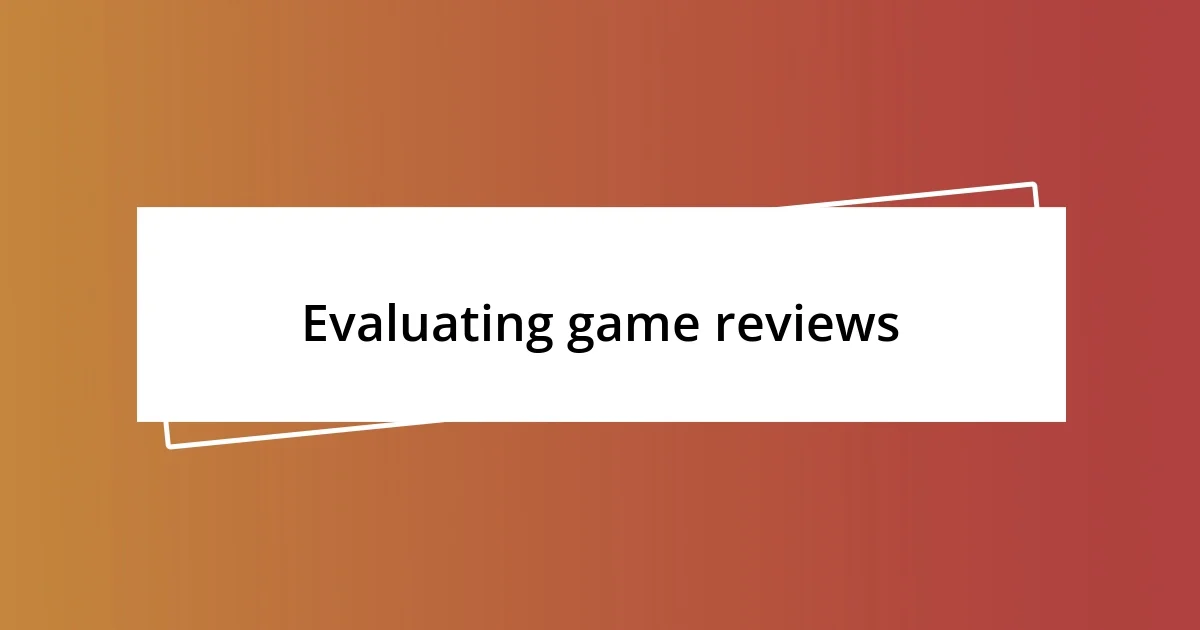Key takeaways:
- Understanding personal preferences and exploring different game genres can enhance the gaming experience and lead to unexpected favorites.
- Evaluating game reviews critically, including the credibility of the source and emotional tone, can inform better purchasing decisions.
- Considering long-term playability through gameplay variety, community involvement, and quality downloadable content ensures lasting enjoyment of games.

Researching game genres
When I dive into researching game genres, I like to think of it as exploring a new universe. Each genre offers a unique emotional experience, whether it’s the adrenaline rush of a first-person shooter or the narrative depth of a role-playing game. I find myself often wondering: what mood am I in? This question helps narrow down my choices and enhances my gaming experience.
I’ve had moments where I overlooked a genre that later turned out to be my favorite. For instance, I was once skeptical about puzzle games, believing they wouldn’t keep my attention. But after giving a highly-rated title a shot, I was surprised by how engaging and satisfying it was to solve intricate problems. It reminded me that stepping outside my comfort zone can lead to wonderful discoveries.
While researching, I often browse forums and watch gameplay videos to get a feel for a genre. Observing how others react to the game can be incredibly insightful. It’s not just about the mechanics; it’s also about the emotional connections players forge with characters and stories, which often resonate with my own experiences and feelings. What about you? Have you found joy in a genre unexpectedly?

Evaluating game reviews
When evaluating game reviews, I often weigh the credibility of the sources behind them. Established gaming websites usually employ experienced reviewers who understand the nuances of gameplay mechanics and storytelling. I can recall a time when I blindly trusted a review from a less-known blog, only to find the game did not live up to the hype. It taught me the importance of checking the reviewer’s background to ensure they align with my gaming preferences.
The tone and detail in a review can also reveal a lot about the game’s potential. If a reviewer expresses genuine excitement about a feature, it can spark my curiosity. I remember reading a review of an indie game that emphasized its innovative art style and soundtrack. This personal touch made me eager to try it out, as I could feel the reviewer’s passion seeping through the text. I always look for that emotional connection in reviews, as it often signals a memorable gaming experience.
Lastly, I pay attention to the overall balance in a review. If a game receives high praise but the reviewer also points out its flaws, it gives me a clearer perspective. For example, I found a review that highlighted a fantastic storyline in a game, yet gently criticized its pacing. This helped me manage my expectations and ultimately led to a more satisfying playthrough. Balancing the positive and negative aspects of a game is crucial for making informed decisions.
| Aspect | Importance |
|---|---|
| Credibility of Source | Helps gauge reliability of opinions |
| Emotional Tone | Indicative of gaming experience |
| Balance of Feedback | Guides realistic expectations |

Considering budget limitations
When it comes to considering budget limitations, I always approach my game purchases with a careful mindset. Having experienced buyer’s remorse more than once, I’ve learned to evaluate how much I’m willing to invest in a game based on factors like playtime and replayability. For example, I remember splurging on a title that promised an epic adventure, only to find it wrapped up in just a few hours. It was disappointing and sobering, teaching me that not all games deliver value for money.
To help me keep a grip on my budget, I often create a list before diving into the store. Here’s what I typically consider:
- Price Point: What is the game’s retail cost? Am I looking for something on sale?
- Genre Enjoyment: Does this genre justify the expense for me based on past experiences?
- Replay Value: Can I see myself returning to this game?
- Long-Term Appeal: Do I think I’ll still enjoy playing it months down the line?
- Reviews on Value: Have other players discussed whether the game feels worth its price?
By keeping these elements in mind, I can make more thoughtful game purchases without risking budget burnout. How do you ensure you’re spending wisely?

Analyzing gameplay mechanics
When I analyze gameplay mechanics, I often focus first on how intuitive the controls feel. I recall picking up a new action game where the button layout felt awkward and clunky. My enjoyment plummeted as I struggled to execute basic moves. That experience reinforced my belief that responsive, user-friendly mechanics can make or break a game.
I also take a close look at how mechanics enhance or hinder creativity and strategy. For instance, in a puzzle game I once played, the mechanics allowed me to experiment and find multiple solutions to challenges. It genuinely felt rewarding, almost like a conversation with the game. That kind of freedom keeps me engaged and eager to explore further. Isn’t it more fun when a game encourages us to think outside the box?
Lastly, I pay attention to how the mechanics evolve throughout the gameplay. I remember diving into an RPG where my character’s abilities expanded in exciting ways. The game introduced new mechanics gradually, keeping the experience fresh and challenging without becoming overwhelming. This thoughtful progression adds layers to the gameplay and fosters an emotional investment. How can any player resist becoming more connected to a game when their growth mirrors their character’s journey?

Checking multiplayer options
Checking multiplayer options
When it comes to multiplayer options, I can’t stress enough how much it influences my buying decision. I remember getting excited about a particular game, only to find it had limited online capabilities. That left me feeling a bit cheated; having friends to play with can transform an otherwise ordinary game into a shared adventure. The camaraderie and competition are what truly elevate the experience for me. How important is it for you to share those moments with others?
I also look into whether the game supports cross-platform play. In my experience, the more players you can connect with—regardless of their console choice—the more vibrant and varied the multiplayer experience becomes. There was a time when I bought a game solely for its cross-play feature and ended up enjoying sessions with friends across different platforms. Those unexpected interactions usually lead to unforgettable memories, and I find myself drawn back to the game time and time again.
Lastly, I consider the community around the game. Is it active and welcoming? I’ve jumped into multiplayer worlds that felt isolating because the player base was small or unwelcoming. On the flip side, playing with a robust, engaged community can turn a good game into a staple in my collection. After all, isn’t it much more enjoyable to strategize with friends or share inside jokes while battling foes? Connecting with fellow gamers can turn any day into a memorable adventure.

Looking for downloadable content
Looking for downloadable content often feels like digging for treasure. I remember stumbling upon a game that offered expansive DLCs filled with new quests and characters, and it reignited my enthusiasm for the title. It felt like getting a sequel without having to wait for years. The prospect of additional adventures and storylines keeps me actively engaged, turning my initial purchase into a more fulfilling journey.
When evaluating downloadable content, I’m particularly drawn to how it enhances the game’s replay value. For instance, I once replayed a favorite RPG after discovering a DLC that introduced an entirely new storyline. Engaging with fresh content breathed new life into the game, making me feel like I was experiencing it for the first time again. Have you ever found yourself drawn back into a game just because of the new content it offered?
It’s also essential to consider the quality of the downloadable content. I once purchased an expansion pack that promised exciting new features, only to find it felt rushed and incomplete. That experience taught me to research user reviews and gameplay videos before making a purchase. Quality matters, and when DLC is done right, it can truly elevate the entire gaming experience. Wouldn’t you agree that a well-crafted expansion can transform a solid game into something extraordinary?

Seeking long-term playability
When I think about long-term playability, I consider how the game’s mechanics and world can keep me engaged beyond the initial playthrough. I often reflect on titles that I still revisit years later—like my all-time favorite, “The Legend of Zelda: Breath of the Wild.” The open world invites exploration and experimentation, and every time I play, I discover something new. Isn’t that what we’re all looking for in a game, a sense of wonder that keeps us coming back for more?
Another crucial factor is the variety of gameplay options available. For instance, I recently played a strategy game that included different modes, from casual play to intense challenges. Each mode offered distinct experiences, and that kept the game fresh. It’s incredible how a single title can adapt to your mood and availability, isn’t it? A game that can transform alongside my interests is a treasure in my collection.
Then there’s the aspect of player-generated content. I became a fan of a game that allowed users to create and share their own levels. I remember the first time I played a user-created quest—what an exhilarating surprise! Watching the community’s creativity unfold not only added replay value but made me feel like I was part of something larger. How exciting is it to engage with other gamers’ ideas and adventures? For me, that sense of community can turn a simple gaming experience into a lasting journey.












